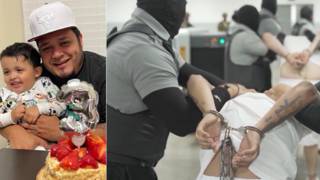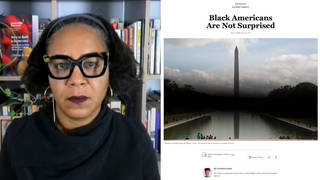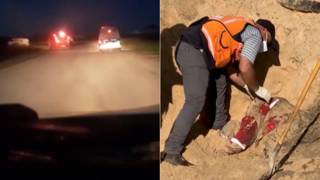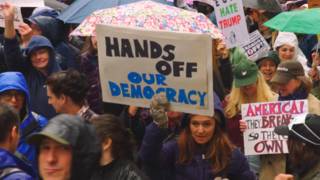
Jules Lobel of the Center for Constitutional Rights and author of the new book Success Without Victory joins us in our studio to discuss prominent cases in American legal history–from Susan B. Anthony’s trial for voting illegally to his own challenges to U.S. foreign policy during the 1980s and 1990s. [Includes transcript]
- Jules Lobel, vice president of the Center for Constitutional Rights. He teaches at the University of Pittsburgh Law School. He is the author of the new book Success Without Victory.
Transcript
AMY GOODMAN: Reading from “Success Without Victory: Lost Legal Battles and the Long Road to Justice in America.” Winners and losers, success and failure, victory and defeat, American culture places an extremely high premium on success and firmly equates it with winning. In politics, sports, business and the courtroom, we have a passion to win and are terrified of losing. Instead of viewing success and failure through a such a rigid lens, Jules Lobel suggests we move past the win or take all model and learn valuable lessons from legal and political activists, who’ve advocated causes destined to lose in court but which have important progressive and long-term effects on American society.
Jules Lobel joins us in the studio, his book, Success Without Victory, hmm.…running against the current of success is victory. Give us a brief historical sketch, Jules, about the lost legal battles that have led to great victories?
JULES LOBEL: The first major campaign was the abolitionists who challenged the fugitive slave laws in court as being unconstitutional and lost over and over again. Yet, in doing so, they helped mobilize Northern opinion against these laws and against the Northern cooperation with slavery and eventually a fellow like Salmon Chase, who was one of the great lawyers who represented these fugitive slaves, his briefs and his arguments became the bedrock platform of the Republican party which was successful politically. So that was one lost case that led to political success.
Susan B. Anthony went to vote in Rochester in 1872, and she said that the 14th amendment should give me a right to vote. It’s denying my equal treatment not to vote. She was–for voting, she convinced the inspectors in Rochester to let her vote, and for this act of voting–she was criminally prosecuted under a law designed to ensnare confederates who were illegally voting.
They prosecuted her, Susan Anthony, and she used her case to reach hundreds of thousands of people around the country to show them how outrageous it was that women weren’t being allowed to vote. Even though she lost in court–she lost in court because they denied her a jury trial–her case was one of the important cases spurring the women’s rights movement and the women’s suffrage movement throughout the country in the 1870’s and 1880’s.
Another case was plant closing activists. In Youngstown, workers were being let go by U.S. Steel when they were closing their plants in Youngstown, Ohio. It was the second leading steelmaker in this country. Today it makes no steel. When I moved to Pittsburgh, it had 55,000 steelworkers, U.S. Steelworkers, throughout the Mon valley. today there are less than 5,000. But the workers didn’t take this lying down. They sat in. They challenged what the U.S. Steel was doing, and they went to court. They got as their attorneys Stouton Lynn, Ramsey Clark, former Attorney General of the United States, and Arthur Kinoy from the Center for Constitutional Rights. Even though they lost in court, their battle spurred many, many other battles to challenge the plant closing and the moving of plants from what was known as the rust belt to the south and to overseas.
The Center for Constitutional Rights waged a long campaign against intervention in Central America. And even though that campaign was unsuccessful in courts, I think that the center, whose basic philosophy is that you use the law not simply to win courtroom victories but to spur social movements, helped in creating an environment in this country against those interventions in Central America.
AMY GOODMAN: How many court cases have you lost?
JULES LOBEL: Oh, I am probably in the Guinness Book of World Records if there is such an entry for the longest losing streak. I’d say about 10 or 15 cases. I recently brought a case which no one would take because it was such a hopeless case, challenging a supermax prison in Ohio. And we won. And, were now on appeal. I didn’t know what to make of it. It was so out of character.
AMY GOODMAN: So, would you consider that a loss, having won?
JULES LOBEL: Yeah. I didn’t… as I said, it totally perplexed me. I was totally confused by this courtroom victory.
AMY GOODMAN: But the victory was what?
JULES LOBEL: The victory was in a case involving the supermax prisons, which are awful situations where you keep people in long term–three, four, five years, sometimes for their life–in small cells where they spend virtually 24 hours a day in isolation. Many of these people are put in without any due process, without any idea that they, the state, has to prove that they did anything. We won a victory saying that they couldn’t put these people in jail in this kind of a supermax prison without first giving them a hearing and proving that they actually did something to deserve being put into this place.
AMY GOODMAN: Because… what is the supermax prison like?
JULES LOBEL: It’s 24 hours locked-up, isolation. A cell as large as a parking space where you don’t have — in this supermax, you never go outside. You don’t breathe fresh air. You don’t have outdoor recreation. You don’t have almost any other contact with any human being. If you can imagine being in a prison where for four or five, six years, you have no contact with any other human being, that’s what it’s like.
AMY GOODMAN: What about your cases around war? Jules Lobel is our guest, professor of international constitutional law at the University of Pittsburgh law school, also vice president of the Center for Constitutional Rights.
JULES LOBEL: Well, we challenged the first Persian Gulf war. I represented Congressman Dellums and 55 other members of congress. Congressman Dellums brought that suit because he felt something had to be done to stop the rush to war in that case. He felt that Bush was going to war without the approval of congress. You know, we had a press conference when that case was filed. All of the reporters wanted to know about was: Did you have any snowball’s chance in hell of winning? that’s all they — that was their main interest. Dellums said to them, that’s an incredibly cynical question, because if you don’t act, if you don’t do anything, you’ll never win. You’ll never get anywhere. We brought this case and the court held that the president couldn’t go to war on his own. But then, at the very end, the dissent said, in the end, that the situation wasn’t right. He had to come back a couple of days before the war started. This was December. The war started in January. We were prepared to go back in January, but because of all of the pressure building on Bush, including our lawsuit, Bush finally went to congress, and as you probably know, he got a narrow approval in the senate to go to war. That mooted out our case, but we felt even though we hadn’t gotten the injunction that we sought, the case had been a political victory in that it had helped create an environment which forced Bush to go to the congress.
AMY GOODMAN: What about now? Last question, the current invasion. Any legal actions currently?
JULES LOBEL: As of right now, there are no legal actions, although I think we’re always trying to see if people — soldiers particularly–want to challenge this war. Now one of our big cases is challenging the situation in Guantanamo, which again we lost in the District Court and the Court of Appeals. Now the case is before the Supreme Court, but that case has–even though it lost in the lower courts–it has kept the outrageous situation in Guantanamo, where these people are being kept with no due process, no legal process whatsoever, it has kept it before the country and the world for almost two years. So, even though we lost in court, again, we think we’re being successful in publicizing what is again a clear violation, I think, of both constitutional law and the Geneva Convention.
AMY GOODMAN: When will the supreme court hear the case?
JULES LOBEL: The supreme court is going to hear it sometime in the early spring. We hope for victory, but whether we win or lose in court, I think we’ll have achieved our purposes.
AMY GOODMAN: Jules Lobel, I want to thank you for being with us. Jules Lobel is the author of “Success Without Victory: Lost Legal Battles and the Long Road to Justice in America.” He is the vice president of the Center for Constitutional Rights.












Media Options